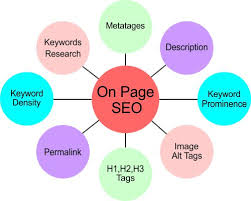On-page SEO is one of the many types of SEO out there.Other types of SEO are technical SEO,off-page SEO and local SEO.On-page SEO is like personal branding,you have to be consistent to achieve the best.
With the advancement of blogging,search engine optimization (SEO), especially on-page SEO optimization remains a crucial aspect of ensuring your website’s success. By optimizing the content and elements on each web page, you can enhance your website’s visibility, increase organic traffic, and improve user experience.
In this blog post, we will explore the top nine on-page SEO best practices that can help you climb the search engine rankings and attract more visitors to your site.
Ensure Every Page Offers Unique Value
Creating unique and valuable content for each page is essential for on-page SEO success. Search engines prioritize websites that offer fresh, relevant, and original information to their users. Avoid duplicating content across different pages, as it can lead to ranking penalties and decreased organic visibility.
Internal Linking
Make sure you do a solid internal linking for better on-page SEO.Internal linking plays a pivotal role in enhancing the overall structure of your website and distributing link equity throughout your pages. By connecting related content with hyperlinks, you enable search engine crawlers to discover and index more of your site’s content.Interrnal linking also enhances user navigation and encourages visitors to explore further, ultimately reducing bounce rates.
Ensure Hreflang Tags Are Error-Free
For websites catering to an international audience, hreflang tags are crucial for on-page SEO success.These tags inform search engines about the language and geographic targeting of specific pages, ensuring that users see the most relevant version of your content based on their location and language preference.
Optimize Images
Optimizing imagaes is one of the best on-page SEO practices of to boost your rankings.Visual content adds significant value to your website, but it should be optimized for both search engines and users. Compress image files to reduce page load times, add descriptive alt tags for accessibility and SEO, and ensure the images are relevant to the content they accompany.

Optimize Title and Meta Tags
Title tags and meta descriptions are vital components of on-page SEO. Craft unique and compelling titles and meta descriptions for each page, including relevant keywords to improve click-through rates (CTRs) and overall search visibility.
Distribute H Tags
Heading tags (H1, H2, H3, etc.) are essential for structuring your content and signaling its importance to search engines. Use them strategically to break up content into sections and make it easier for both users and search engines to understand the hierarchy of information on the page.Once you get the H tags right,your on-page SEO will be on the go.
Improve Page Load Speed
Page load speed is a crucial factor in on-page SEO and user experience. For better results you should optimiize your website’s performance by compressing images, leveraging browser caching, and minifying CSS and JavaScript files. A faster website not only improves search rankings but also keeps visitors engaged and more likely to convert.
Use Schema Markup
Schema markup is a powerful tool that allows you to provide additional context to search engines about your content. By implementing structured data with schema markup, you can enhance the appearance of search results and increase the chances of appearing in rich snippets, which can improve click-through rates.
Outbound Links
Outbound links are external links to other reputable websites,These links improve your on-page SEO and add credibility and authority to your content. When linking to relevant and high-quality sources, search engines view your website as a valuable resource, potentially boosting your rankings.
Incorporating these on-page SEO best practices into your website’s optimization strategy can significantly impact your search engine rankings and overall online visibility.SEO is an ongoing process, and staying up-to-date with the latest trends and algorithm changes is essential.
By providing unique value, optimizing your content and technical aspects, and improving user experience, you can create a solid foundation for long-term on-page SEO success.
You can get more information on improving SEO for your website here

